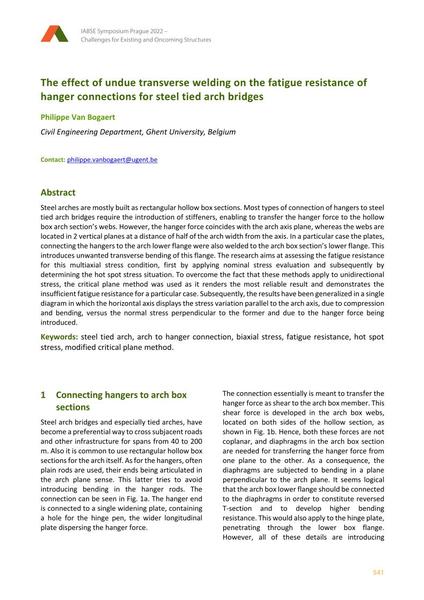The effect of undue transverse welding on the fatigue resistance of hanger connections for steel tied arch bridges

|
|
|||||||||||
Bibliografische Angaben
| Autor(en): |
Philippe Van Bogaert
(Civil Engineering Department, Ghent University, Belgium)
|
||||
|---|---|---|---|---|---|
| Medium: | Tagungsbeitrag | ||||
| Sprache(n): | Englisch | ||||
| Tagung: | IABSE Symposium: Challenges for Existing and Oncoming Structures, Prague, Czech Republic, 25-27 May 2022 | ||||
| Veröffentlicht in: | IABSE Symposium Prague 2022 | ||||
|
|||||
| Seite(n): | 541-546 | ||||
| Anzahl der Seiten (im PDF): | 6 | ||||
| DOI: | 10.2749/prague.2022.0541 | ||||
| Abstrakt: |
Steel arches are mostly built as rectangular hollow box sections. Most types of connection of hangers to steel tied arch bridges require the introduction of stiffeners, enabling to transfer the hanger force to the hollow box arch section’s webs. However, the hanger force coincides with the arch axis plane, whereas the webs are located in 2 vertical planes at a distance of half of the arch width from the axis. In a particular case the plates, connecting the hangers to the arch lower flange were also welded to the arch box section’s lower flange. This introduces unwanted transverse bending of this flange. The research aims at assessing the fatigue resistance for this multiaxial stress condition, first by applying nominal stress evaluation and subsequently by determining the hot spot stress situation. To overcome the fact that these methods apply to unidirectional stress, the critical plane method was used as it renders the most reliable result and demonstrates the insufficient fatigue resistance for a particular case. Subsequently, the results have been generalized in a single diagram in which the horizontal axis displays the stress variation parallel to the arch axis, due to compression and bending, versus the normal stress perpendicular to the former and due to the hanger force being introduced. |
||||
| Stichwörter: |
Strukturspannung Ermüdungsfestigkeit Bogen-Hänger-Verbindung
|
||||
| Copyright: | © 2022 International Association for Bridge and Structural Engineering (IABSE) | ||||
| Lizenz: | Die Urheberrechte (Copyright) für dieses Werk sind rechtlich geschützt. Es darf nicht ohne die Zustimmung des Autors/der Autorin oder Rechteinhabers/-in weiter benutzt werden. |
||||
